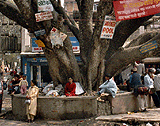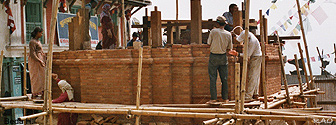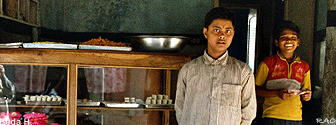Honourable Deputy Prime Minister and Minister of Foreign Affairs, KP Sharma Oli, our Chief Guest, Heads of Constitutional Bodies, Ministers of the Government of Nepal, Leaders of political parties, Excellencies, Our colleague and friend, Mr. Kul Chandra Gautam, Deputy Executive Director of the UN Children's Fund Distinguished guests, Colleagues, Ladies and Gentlemen: On behalf of the United Nations Country Team in Nepal, it gives me great pleasure to welcome all of you to the UN House to celebrate the 61st United Nations Day, and to thank you all for being with us. We also wish to express again our deepest sorrow on the loss of our friends and colleagues who died in the helicopter crash on 23 September. We remember them fondly, and today especially we miss them, as many of them would have been with us. This is my fourth consecutive year celebrating UN Day in Nepal, but this is the first year when, as a result of the determination of the people of Nepal, there is no fighting - and there has been no fighting for six months. There have been six months of political renewal, of political change, of discussions in many, many fora, and of negotiations towards a broad political understanding, towards a new political order, and towards restoring a lasting peace. The appointment of the Personal Representative of the Secretary- General in Nepal for Support to the Peace Process, Mr. Ian Martin, and the arrival of all members of his team, is the incarnation of the UN's willingness to help the Nepali people, civil society and political parties ensure a peaceful atmosphere for further change through the process of a Constituent Assembly. Ian will share his vision with us a little later this morning. This year we have been joined by new colleagues as representatives of the Food and Agricultural organisation, the International Labour Office, the World Food Programme, and The UN Department of Safety and Security. The UN Office on Drugs and Crime, and a sister organisation of the UN family, the International Organisation for Migration, have also set up initially modest, but substantive and permanent, presences in Nepal- here, in The UN House. On a more personal level, all his UN colleagues were thrilled when Squiz (more officially know as Mark Squirrell) of WFP reached the top of Everest in May this year. I am also very pleased that the long-awaited transfer to Kathmandu of the UN Regional Centre for Peace and Disarmament for Asia and the Pacific, under the UN Department of Disarmament Affairs, is about to happen. The budgetary and administrative issues are being finalised in a practical fashion, to allow the UN and the Government of Nepal to review and, I hope, agree on a Memorandum of Understanding. I believe we should mention especially the role of the Office in Nepal of the UN High Commissioner for Human Rights, the largest in the world, with over 130 staff. The High Commissioner presented her report on Nepal to the General Assembly yesterday, describing some of the positive steps which have been taken, and saying that the peace process offers a hope of continuing improvements in respect for human rights by all parties. It stresses that there are many issues which still need to be addressed, including abductions, ill-treatment, killings and child recruitment by the CPN-M, as well as violations by the security forces. The report notes that ending impunity remains one of the major human rights challenges: OHCHR continues to press for accountability for past violations in order to prevent future violations. Human rights must remain central to the peace process for a sustainable peace to be secured. Equally, any setback to the peace process risks a negative and potentially devastating impact on the human rights situation. And, as was announced two days ago, the High Commissioner has appointed Ambassador Lena Sundh as her Representative, and Head of the Office, in Nepal. We look forward to welcoming her here in a couple of weeks or so. We remain, however, concerned that the National Human Rights Commission remains without Commissioners to direct the work of the very good staff. We trust that an independent, non-partisan, and effective Commission will be fully in place in the nearest future. The situation of one lakh of Bhutanese refugees remains as pre-occupying as ever. We are, however, encouraged by the invitation extended by the Government of Nepal to the Royal Government of Bhutan to bilateral talks, I believe in the middle of next month, and we hope that the outcome of this meeting will be positive. We are encouraged by the agreement of the Government of Nepal to carry out a detailed census of the camp population, according to the standards and procedures adopted by UNHCR globally, to start after Tihar. We urge that a definite date be announced quickly to allow the refugees to all be present in the camps, and for the logistical arrangements to be ready. We believe that, as the fundamental principle for the durable solution of all refugee issues, it is the freely-expressed wish of the individual women and men which must be the basis for the solutions which would suit each individual and family best. The recent offers by some countries, notably the USA, to accept significant numbers for resettlement are welcome, and have helped ensure that the various options are opened up for discussion among the refugees themselves in a practical context. As has been the case for many years now, Nepal continues to be one of the main contributors of troops for the UN's peace-keeping operations around the world, with some 3,500 serving at present, making Nepal the fifth largest contributor. We are particularly glad that Nepal has agreed to provide a sizable contingent to the UN Interim Force in Lebanon (UNIFIL), thus returning to an area which is well-known to men and officers of the Nepali Army. Let me return to the theme of peace in Nepal. For the development and humanitarian activities, which are the task of the UN Agencies, Funds and Programmes, peace would allow us to focus our efforts more effectively on human development. I said three years ago that I am somewhat wary of the phrase "Millennium Development Goals" and even more of the abbreviation "MDGs". We must think of these goals, not as abstract concepts or statistical aggregates, but as the lives, the opportunities, the futures, of individual children, women, and men, of our daughters and sons. When I visited a village, not at all remote, in Saptari district, last month, I was struck by the women telling me that, after only a few years experience of a social mobilization effort, they now thought that their daughters should not be married off at the age of 12 - but at 15 or 16; that perhaps primary and some secondary schooling might be good for the girls, rather than making them more difficult to marry off; and that their daughters would know, as they had not, that it was entirely possible and natural to plan the births of children, instead of simply becoming pregnant every year. When you hear phrases about "attaining the MDGs by 2015", I suggest we think: will every girl born today, the 20th of October 2006, in Taplejung, or Bahjang, or Rukum, be, in nine years time, in her fourth year of primary school - of the same quality as at St. Mary's? Members of so-called lower castes and people from ethnic groups, as well as women, continue to be excluded from making decisions. The recent closure of the bazaar in Silghadi (Doti district) by so-called upper-caste groups to prevent Dalits from entering the Shaileshwori temple, and to exclude and ostracize them even further, demonstrated that simply passing laws, issuing declarations, or making token gestures to inclusiveness will not resolve the real conflict that exists in Nepal. Just last week I handed over parallel letters from the Representative of the Secretary-General for the Human Rights of Internally Displaced Persons, Prof. Walter Kaelin, a long-time friend of Nepal, addressed to the Prime Minister, Mr. Koirala and to the CPN-Maoist Chairman Prachanda. In these letters, Prof. Kaelin applauded the public commitment by the CPN-Maoist to allow the return of displaced persons, but expressed concern that central level policy is not being followed in the field. He voiced the need to return unconditionally property and land, and end other human rights violations. He highlighted the need for the Government of Nepal to revise the definition of internally displaced persons to bring it in line with the UN Guiding Principles. He also stressed that a national policy and implementation plan on internal displacement needs to be finalized and put in place urgently. The successful return of the internally displaced will be a measure of the true success of the entire peace process and rebuilding of society. A few weeks ago, on behalf of Nepal's international development partners, the United Nations also presented a note to the Government and the CPN (M) urging them to cooperate so that development activities can promote understanding, collaboration and reconciliation at the local level. We urged the Seven Party Alliance and the Maoists to make it possible to deliver services effectively and without hindrance so that concrete and visible improvements in people's living conditions can be made now, not at some abstract point in the future. Today in Nepal critical development and humanitarian efforts, intended to deliver services to the country's most vulnerable groups, are being held back by an increase in breaches of the Basic Operating Guidelines. This is of great concern to the UN and all Nepal's development partners, and this climate of uncertainty must be addressed if the nation is to secure greater confidence within the international community, and achieve the goals for better lives within the next nine years. Bolder action needs be taken in support of the 15 women who die every day while giving birth. Bolder action is needed to help the far too many children who never turn five because the water they drink is dirty, or because they can't access the cheapest of vaccines. For the gravely ill who need to walk across mountains and valleys to reach the nearest health centre. For the hungry who have silently lost their harvest year after year. For the scores of thousands, who live with HIV/AIDS and have no access to antiretroviral treatment. For the families of the disappeared who deserve to know what has happened to them. For the tortured who await justice. For the girls and women who follow the promises of a better life only to fall into the darkness of prostitution and destitution. For the youth who wonder what they will do today, tomorrow, the day after: Achieving the Millennium Development Goals is about their lives. True, the past decade has seen a rise in people's incomes, life expectancy, and literacy levels - and yet, over half the adults in Nepal are illiterate. The Nepal MDG Needs Assessment launched three days ago tells us that donor support will need to be doubled over the next decade. I believe the international community is willing to invest in well-planned, well-managed and well-monitored national efforts. But this willingness must be accompanied by an environment where national development initiatives and humanitarian action can be carried out impartially, without threat or intimidation. Chief Guest, Excellencies, Distinguished Guests, Ladies and Gentlemen, The UN development and humanitarian Agencies, Funds and Programmes continue to work in all seventy-five districts of this country. Last year we spent some $86 million in grants in Nepal. For the first time ever, this year the UN and its partners are providing emergency food and other help to communities affected by drought in the Karnali - and we are ready to expand such assistance, as we will extend it for the renewal of civilian activities as the peace process is consolidated. A few days ago, on 17 October, The International Day for the Eradication of Poverty, some 24 million people around the world "stood up against poverty", three-quarters of these "stood up" in Asia, and one in every six of the Asians "stood up" in Nepal - over three million people. They included a number of us who "stood up" here, in The Rose Garden. We stood up to demand, not charity, but justice; not promises and commitments, but action; not in the next budget or plan or programme, but now. Let it never be said by future generations in Nepal or elsewhere that we failed to live up to the ideals of humanism which the United Nations was founded to advance. Thank you.
|




